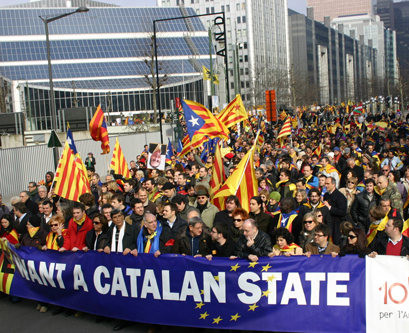29.08.2014 - 15:19
The map of Europe could change in the near future after the independence referendums in Scotland (18 September) and Catalonia (9 November). Even more than half of the States in Europe became independent after 1900, the subject arises a great deal of public interest. Media reports comparing the Scottish and the Catalan model abound and there are also several academic and public events on the matter planned in Europe during the next two months, four of them already in the next ten days.
Brussels
Two of these events will take place in the heart of the EU, in Brussels. The Centre for European Policy Studies (CEPS), one of the most influential think tanks in Brussels, has organised a round table on 8 September with the support of the Diplomacy Council of Catalonia. The participants in the debate, titled ‘In or out? Scotland, Catalonia and the EU’, will be Roger Albinyana, Secretary for Foreign and European Affairs of the Government of Catalonia; Steven Blockmans, CEPS Senior Research Fellow; Montserrat Guibernau, Professor of Political Science at the Queen Mary University of London; Nicola McEwen, Associate Director of the ESRC Scottish Centre on Constitutional Change at the University of Edinburgh; and Alyn Smith, SNP Member of the European Parliament. Some days before, on 3 September, it is the German Friedrich Naumann Foundation in Brussels who organises a panel discussion on ‘EU 30? – the Scottish and Catalan independence referenda and their implications for the EU’ with specialists from EU instituions and academia, including Catalan and Scottish academic experts.
Paris
The political situation in Catalonia will be the key issue of a debate in Paris on 5 September, hosted by the prestigious MADP Chair of Sciences Po. ‘Self-determination processes in the European Union: The case of Catalonia’ will be divided into two roundtable discussions. The first will deal with the philosophy behind the right to decide and self-determination within the European Union as a culmination of a democratic process. The participants will include Alain-G Gagnon, Professor of Political Science at the University of Quebec and Director of the Interdisciplinary Centre of Research on Diversity and Democracy (CRIDAQ); Gérard-François Dumont, Rector and Professor at the University of Paris-Sorbonne; Eduard Sagarra, Professor of Public International Law at the University of Barcelona and at ESADE; and Jean-Bernard Auby, Professor at Sciences Po and Director of the Chair MADP. The second round table discussion, on the possible emergence of new states within the European Union, will include the participation of Graham Avery, Senior Adviser at the European Policy Center (EPC) and Honorary Director General of the European Commission; Francina Esteve, Professor of Public International Law at the University of Girona; and Kai-Olaf Lang, Head of the Research Division at the German Institute for International and Security Affairs (SWP).
Amsterdam
The fourth international event on Catalonia will take place in Amsterdam on 3 September and will be the presentation of the Dutch version of the novel Victus, a Catalan historical bestseller by novelist Albert Sánchez Piñol. The Dutch Editorial Signatuur, also with the support of the Public Diplomacy Council, who financed its translation, have planned a round table with the title ‘Victus, the fall of Barcelona and European history’. Speakers will be Albert Sánchez Piñol, author of the novel, Quim Torra, writer and Director of the Born Cultural Centre in Barcelona, and Dr J.Th. Leerssen, professor of European Studies at the University of Amsterdam. Dr Leerssen will speak on the historical background of the book and will lead the following discussion on the consequences of the war and the meaning of its peace treaties today, 300 years later. Victus is a historical novel that narrates the War of the Spanish Succession, a conflict that could be considered one of the first world struggles. Although in 1713 the Treaty of Utrecht concluded a ceasefire among both sides, the Catalans kept fighting to protect their rights and freedoms. That fight ended on 11 September 1714 with the apocalyptic assault on Barcelona.




